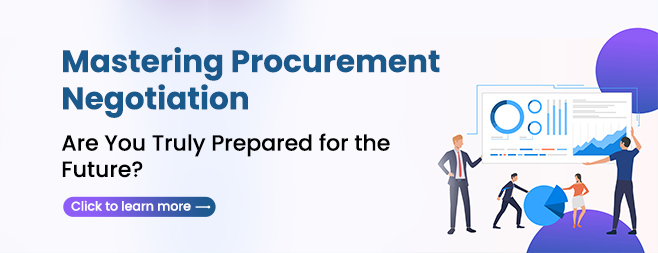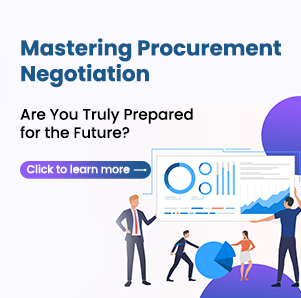Mastering Procurement Negotiation: Are You Truly Prepared for the Future?
Mastering Procurement Negotiation: Are You Truly Prepared for the Future?


By Sanjay Puri, CEO, C1 India
"Did you know that over 60% of procurement leaders believe that negotiating skills will we the most critical factor in driving value over the next five years?"
In an ever-evolving global market, procurement has become more than just purchasing goods and services-it's about strategic partnership, risk management, and value creation. The success of these initiatives often hinges on one crucial skill: negotiation. But how well are procurement leaders truly equipped for this critical role?
The Changing Landscape of Procurement Negotiation
Today's procurement landscape is more complex than ever. According to a recent report by Deloitte, 70% of procurement leaders say that reducing costs is still a top priority, yet only 39% feel they have the skills needed to deliver this. With the rise of digitalization, global supply chain disruptions, and increasing regulatory demands, traditional negotiation tactics are no longer sufficient. Procurement professionals must adapt to a more holistic, strategic approach.
Why Negotiation is More Than Just a Skill-It's a Strategic Advantage
- Building Resilient Supply Chains: In the wake of global disruptions, from pandemics to geopolitical tensions, having strong negotiation skills can mean the difference between a resilient supply chain and one that's easily broken. Effective negotiation ensures access to critical resources, alternative suppliers, and better contract terms.
- Driving Innovation: Strategic negotiation isn't just about cost-cutting; it's about value creation. Collaborating with suppliers to innovate and co-create solutions can lead to groundbreaking products, streamlined processes, and long-term growth.
- Enhancing Supplier Relationships: A skilled negotiator understands the value of partnership over adversarial bargaining. By focusing on win-win outcomes, procurement leaders can foster stronger, more collaborative relationships that benefit both parties.
Strategies for Effective Procurement Negotiation
- Data-Driven Decision Making: Leverage real-time analytics and market intelligence to understand the total cost of ownership, supplier performance, and market trends. This data empowers procurement professionals to make informed decisions and negotiate from a position of strength.
- Emotional Intelligence: Successful negotiation is as much about managing emotions and understanding human behavior as it is about numbers and terms. Building trust, demonstrating empathy, and communicating clearly are key components of effective negotiation.
- Cross-Functional Collaboration: Involve stakeholders from other departments, such as finance, legal, and operations, to ensure that all aspects of the business are considered. This collaborative approach can help secure buy-in from all parties and lead to more successful outcomes.
- Continuous Learning: The procurement world is constantly evolving, with new trends and challenges emerging regularly. Invest in ongoing training and development to keep your negotiation skills sharp and stay ahead of the curve.
Challenges to Overcome
- Lack of Training: Many organizations do not provide adequate negotiation training to their procurement teams, which can lead to missed opportunities and suboptimal deals.
- Cultural Differences: In global procurement, cultural nuances can impact negotiation styles and outcomes. Being aware of and adapting to these differences is crucial for success.
- Balancing Short-Term Wins with Long-Term Goals: While immediate cost savings are important, focusing solely on short-term wins can harm supplier relationships and long-term value creation.
The Future of Procurement Negotiation
As we move forward, the role of negotiation in procurement will only grow in importance. With the integration of AI and machine learning, negotiation will become more data-driven, allowing for predictive analytics and real-time insights. However, the human element—empathy, creativity, and strategic thinking—will remain irreplaceable.
Let's Connect to explore more:
What negotiation challenges are you facing in your organization? Share your insights and experiences in the comments below. Let's learn and grow together to enhance our procurement strategies and achieve better outcomes with C1.
